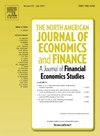Extreme weather events as the main driver of electricity price volatility in Italy: A GARCH-MIDAS approach with machine learning-based variable selection
IF 3.9
3区 经济学
Q1 BUSINESS, FINANCE
North American Journal of Economics and Finance
Pub Date : 2025-08-13
DOI:10.1016/j.najef.2025.102512
引用次数: 0
Abstract
This paper investigates the impact of extreme weather events on electricity price volatility in Italy, employing a novel combination of advanced econometric techniques and a robust variable selection process. First, we provide empirical evidence that extreme weather events significantly predict electricity price volatility. We compile a comprehensive set of economic and financial variables known in the literature to influence electricity price volatility and apply the Best Path Algorithm (BPA) for variable selection, identifying the most relevant predictors. A Granger causality analysis of the selected variables confirms that extreme weather events not only emerge as the primary factor driving volatility but also exhibit a clear unidirectional causal relationship.
Second, we integrate weather variables into a GARCH-MIDAS model, to combine high-frequency electricity price data with low-frequency climate data, thereby capturing both short- and long-term volatility components. Additionally, we incorporate external shocks—such as the Russia–Ukraine war—as exogenous variables to account for broader geopolitical influences on the energy market. Our findings underscore the substantial predictive power of extreme weather events and external shocks on electricity price dynamics.
This study enhances forecasting capabilities for policymakers and energy stakeholders, highlighting the urgent need for resilient energy market planning. Future research may extend this methodology to other regions and incorporate additional variables to further improve predictive accuracy.
极端天气事件是意大利电价波动的主要驱动因素:基于机器学习变量选择的GARCH-MIDAS方法
本文研究了极端天气事件对意大利电价波动的影响,采用了先进计量经济学技术和稳健变量选择过程的新颖组合。首先,我们提供了极端天气事件显著预测电价波动的实证证据。我们编制了一套全面的经济和金融变量在文献中已知的影响电价波动,并应用最佳路径算法(BPA)进行变量选择,确定最相关的预测因子。对所选变量的格兰杰因果分析证实,极端天气事件不仅是波动率的主要驱动因素,而且表现出明显的单向因果关系。其次,我们将天气变量整合到GARCH-MIDAS模型中,将高频电价数据与低频气候数据结合起来,从而捕获短期和长期波动成分。此外,我们将外部冲击(如俄乌战争)纳入外生变量,以解释更广泛的地缘政治对能源市场的影响。我们的研究结果强调了极端天气事件和外部冲击对电价动态的实质性预测能力。本研究提高了决策者和能源利益相关者的预测能力,强调了弹性能源市场规划的迫切需要。未来的研究可能会将这种方法扩展到其他地区,并纳入额外的变量,以进一步提高预测的准确性。
本文章由计算机程序翻译,如有差异,请以英文原文为准。
求助全文
约1分钟内获得全文
求助全文
来源期刊
CiteScore
7.30
自引率
8.30%
发文量
168
期刊介绍:
The focus of the North-American Journal of Economics and Finance is on the economics of integration of goods, services, financial markets, at both regional and global levels with the role of economic policy in that process playing an important role. Both theoretical and empirical papers are welcome. Empirical and policy-related papers that rely on data and the experiences of countries outside North America are also welcome. Papers should offer concrete lessons about the ongoing process of globalization, or policy implications about how governments, domestic or international institutions, can improve the coordination of their activities. Empirical analysis should be capable of replication. Authors of accepted papers will be encouraged to supply data and computer programs.

 求助内容:
求助内容: 应助结果提醒方式:
应助结果提醒方式:


